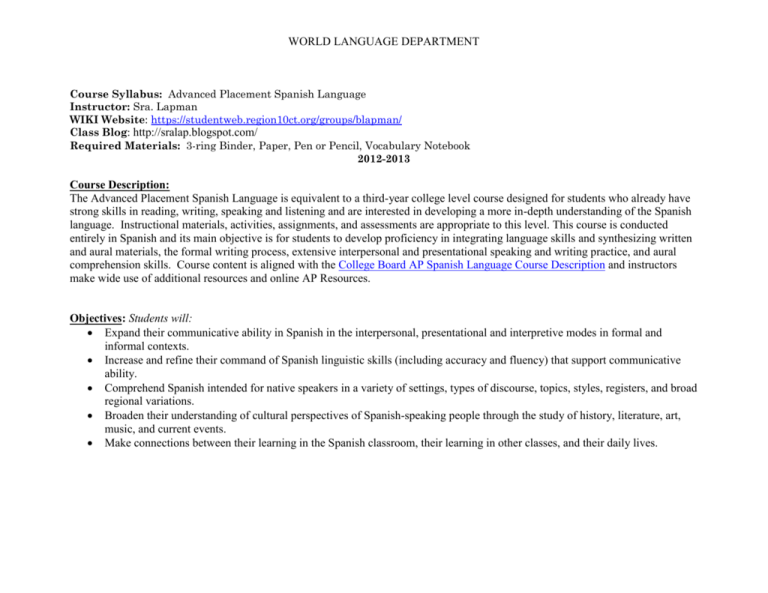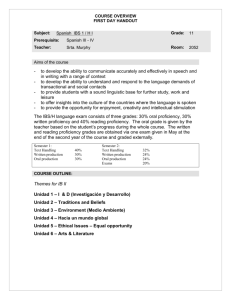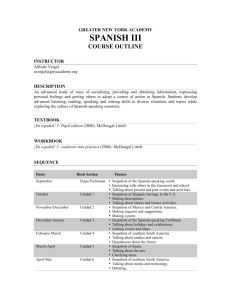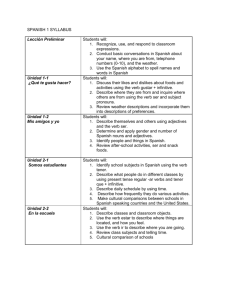
WORLD LANGUAGE DEPARTMENT
Course Syllabus: Advanced Placement Spanish Language
Instructor: Sra. Lapman
WIKI Website: https://studentweb.region10ct.org/groups/blapman/
Class Blog: http://sralap.blogspot.com/
Required Materials: 3-ring Binder, Paper, Pen or Pencil, Vocabulary Notebook
2012-2013
Course Description:
The Advanced Placement Spanish Language is equivalent to a third-year college level course designed for students who already have
strong skills in reading, writing, speaking and listening and are interested in developing a more in-depth understanding of the Spanish
language. Instructional materials, activities, assignments, and assessments are appropriate to this level. This course is conducted
entirely in Spanish and its main objective is for students to develop proficiency in integrating language skills and synthesizing written
and aural materials, the formal writing process, extensive interpersonal and presentational speaking and writing practice, and aural
comprehension skills. Course content is aligned with the College Board AP Spanish Language Course Description and instructors
make wide use of additional resources and online AP Resources.
Objectives: Students will:
Expand their communicative ability in Spanish in the interpersonal, presentational and interpretive modes in formal and
informal contexts.
Increase and refine their command of Spanish linguistic skills (including accuracy and fluency) that support communicative
ability.
Comprehend Spanish intended for native speakers in a variety of settings, types of discourse, topics, styles, registers, and broad
regional variations.
Broaden their understanding of cultural perspectives of Spanish-speaking people through the study of history, literature, art,
music, and current events.
Make connections between their learning in the Spanish classroom, their learning in other classes, and their daily lives.
WORLD LANGUAGE DEPARTMENT
Student Expectations: In this course, students are expected to:
Express themselves in Spanish throughout the course
Read and write extensively
Read short stories, news articles, plays, and other works in Spanish
Listen to authentic sources both in and out of the classroom setting
Create simulated AP integrated activities
Keep a writing journal to record and auto correct errors
Course outline
For our AP Spanish Language course, we use the following texts as core materials:
Abriendo Paso: Gramática (Boston, MA: Pearson Prentice Hall, 2007)
Abriendo Paso: Lectura (Boston, MA: Pearson Prentice Hall, 2007)
Triángulo (Sandwich, MA: Wayside Publishing, 2006)
AP Spanish: Preparing for the Language Examination (Boston, MA: Pearson Prentice Hall, 2007)
Students have copies of all texts, which are used to review previously taught principles and provide authentic practice. Our focus in
AP Spanish is not to teach grammar principles and basic vocabulary, but rather to incorporate them into the skills needed to perform
well on the AP Spanish exam and in the real world of communication. The Abriendo Paso books are used as review and reference to
allow students the recycling and necessary practice required of advanced communication.
In addition to the above cited materials, we also use resources from the Internet, including BBC Mundo, Hispanic radio and television
stations, current podcasts, etc. to keep students up to date on current affairs in the Spanish-speaking world.
WORLD LANGUAGE DEPARTMENT
Websites for news and information in Spanish:
BBC Mundo
http://news.bbc.co.uk/hi/spanish/news/
El País
http://www.elpais.com/
Latin American Network Information Center
http://lanic.utexas.edu/
Cadena de Television
http://www.univision.com/
Radio Naciones Unidas
http://www.un.org/radio/es/
Prensa Escrita
http://www.prensaescrita.com/
Yabla
www.yabla.com
CNN en español
www.cnn.com/espanol
Websites for reference and grammar study:
Colby Spanish Exercises
http://www.colby.edu/-bknelson/exercises/
WordReference.com
http://www.wordreference.com/
Academia Real de la Lengua Española
http://www.rae.es/
On-line Abriendo Paso literature:
http://www.phschool.com/webcodes10/index.cfm?fuseaction=home.gotoWebCode&wcprefix=jjk&wcsuffix=9999
WORLD LANGUAGE DEPARTMENT
COURSE PLANNER
First Semester
UNIT
UNITS FROM TRIANGULO
(VOCABULARY THEMES)
UNITS FROM ABRIENDO PASO
(GRAMMAR TOPICS)
SELECTIONS FROM ABRIENDO PASO
(LITERARY EXCERPTS)
Unit 1
Unidad 9: El prójimo: características
físicas, emociones, familia, personalidad
Unidad 1: La narración y la descripción en el
pasado
(Pretérito, imperfect, pluperfect indicative)
Horacio Quiroga (El hijo)
Julio Cortázar (Continuidad de los parques,
La puerta condenada)
(Unidad 9: El prójimo)
Unidad 2: La descripción de nuestros
alrededores: diferencias y semejanzas
(presente de indicative, adjectivos)
(pronombres)
(comparativos y superlativos )
Unidad 10: De todo un poco: avances,
tecnológicos, leyes, policía, política, el
futuro
Unidad 3: La narración y la descripción en el
presente
(Verbos reflexivos, los pronombres)
Juan Rulfo (No oyes ladrar los perros)
Unidad 4: Cómo expresar deseos y
obligaciones
Ana Ma Matute (El árbol de oro)
Unit 2
Unit 3
Unit 4
Unidad 5: El Ocio: arte, ciencia ficción,
espectáculos, fiestas, música, sueños,
teléfono, televisión
Unidad 1: El hogar: aparatos, comida,
herramientas, muebles, quehaceres,
ropa
Unidad 4: El turismo: aeropuerto,
caminos, culturas extranjeras,
medios de transporte
Unidad 3: El Medio Ambiente: el aire
libre, animales, tiempo, topografía
Sabine R. Ulibbarí (Un oso y un amor, Mi
caballo mago)
Gustavo Adolfo Bécquer (Rima LIII, Rima
XI)
Pablo Neruda (Me gusta cuando callas, Oda
al tomate)
(Unidad 5: El ocio)
Unit 5
Emilia Pardo Bazán (El décimo, Las medias
rojas)
Unidad 5: La narración y la descripción en el
futuro: cómo expresar emoción, duda,
negación, probabilidad o conjetura
(Futuro y condicional)
Gabriel García Márquez (La viuda de
Montiel, Un día de estos)
Isabel Allende (Cartas de amor traicionado,
Dos palabras)
WORLD LANGUAGE DEPARTMENT
Second Semester
UNIT
Unit 6
UNITS FROM TRIANGULO
(VOCABULARY THEMES)
Unidad 8: El Comercio: finanzas,
profesiones, tiendas, trabajos
Unidad 6: El deporte: actividades, ejercicio,
equipo, lugares
Unit 7
Unidad 2: La Salud: accidentes, cuerpo,
emergencias, medicina, médicos
UNITS FROM ABRIENDO PASO
(GRAMMAR TOPICS)
Unidad 5: La narración y la descripción en el
futuro: cómo expresar emoción, duda,
negación, probabilidad o conjetura
(Futuro y condicional)
SELECTIONS FROM ABRIENDO PASO
(LITERARY EXCERPTS)
Jorge Luis Borges (Emma Zunz, el Sur)
Antonio Machado (Proverbios y cantares,
XXIX; Soledades, II)
Unidad 6: La narración y la descripción en el
pasado (segunda parte)
(El condicional y el potencial compuesto)
Versos sencillos (José Martí)
(Unidad 3: El Medio Ambiente)
Unit 8
Unidad 7: La Educación
Repaso general de todos los verbos
Isaac Aisemberg (Jaque Mate en Dos
Jugadas)
WORLD LANGUAGE DEPARTMENT
EVALUATION
1. 10% - Homework/Participación
2. 40% - Speaking and Listening
This category includes scored in-class activities, paired and group dialogues, and listening to tapes and videos. More formal
assessments, such as practice AP exams, oral and listening quizzes, tests, and projects, are also included.
3. 40% - Writing and Reading
This category includes scored in-class activities, such as reading assignments, informal compositions, and computer lab tasks. More
formal assessments, such as practice AP exams, written and reading quizzes, tests, projects, and journal compositions, are also
included.
4. 10% - TESTS / AP EXAMS
This category includes simulated AP exams taken at the instructor’s discretion.
Midterm Exam (10 % of overall grade)
The midterm exam will be an actual AP exam that has been released. In addition to this exam, students will also have at least two
other practice exams in addition to a diagnostic test at the beginning of the year.
Final Exam (not required for students with a 90 or higher average)
The final exam will be a project that gives students the opportunity to interpret one of the reading selections by creating a video
version. More information and models from the previous year will be provided after the AP exam.
WORLD LANGUAGE DEPARTMENT
SAMPLE STUDENT PRACTICE/ACTIVITIES
Listening Practice:
Students listen to a variety of audio selections to become familiarized with general differences and variations in accent and register of
heritage Spanish-speakers in both formal and informal circumstances. They listen to taped lectures, narratives, conversations, and
songs, and watch or listen to Hispanic music and video programs in addition to selected films. Students are always provided with a
graphic organizer, such as an index card with five question words, an outline, a grid, a cloze passage, and multiple choice or openended questions. The goal is for students to listen for controlled information and to learn to extract details versus main ideas. Students
may also be asked to respond to the selection with a brief message: an oral answer, a short e-mail, a short letter, an announcement or
an ad. Most students connect well to music and a Spanish-speaking musician is featured monthly. Students listen to various songs
from the featured artist while completing a guided prompt that serves to synthesize skills. Students’ vocabulary is also enriched
through this practice.
Speaking Practice:
All activities take place in the target language. Students are given ample opportunities to use Spanish in both the interpersonal and
presentational modes. Students participate in conversational role-plays with other students and they are also given tasks requiring
impromptu speech as well as prepared oral presentations. On “tertulia” day, students are given a topic and have two minutes to think
about it; then they have two to three minutes to talk about the topic. Topics include current events, a Hispanic author or work being
read, a cultural topic from a Spanish-speaking country, or their own personal topic. This activity is structured in small groups to
synthesize the topics presented and to include participation and comprehension of all students. Most speaking practice is recorded with
hand-held digital recorders and saved to teacher’s electronic student folders.
WORLD LANGUAGE DEPARTMENT
Reading Practice:
Students read a wide variety of authentic reading materials ranging from literary texts, to newspaper & magazine articles, as well as
on-line publications. The Abriendo Paso Lectura is a collection of short stories, poems, plays, and printed media articles from Spain,
Latin America, and the United States. The selected readings were chosen for their high level of interest to high school students and for
their level appropriateness. The selection offers a wide range in genre, theme, style, length and degree of difficulty. Chapters are
ordered based on increasing levels of difficulty. There is an accompanying CD with listening activities based on the readings.
Acquisition of extensive vocabulary and discussion of themes and literary techniques require students to use higher order and critical
thinking skills. In pairs, students are asked to read selected short stories and present them to the class. Each pair must provide
members of the class with a written and/or visual guide, and they must use a visual while presenting their stories (a cartoon or a
picture sequence of events).
Students also read longer reading selections (course planner) that vary in genre in order to develop a familiarity with literary
analysis, vocabulary and to compare and contrast characters, themes, climaxes, and important story details. After reading these
selections, students view one of them in film form and travel to the Spanish Repertoire Theatre in NY to view another. These
experiences provide students with ample opportunities to practice summarizing & synthesizing materials.
Writing Practice:
Students practice formal and informal writing tasks. Students write summaries and essays and time is allotted for planning, prewriting,
and proofing. They write different types of documents which include letters, e-mails, ads, & film scripts.
Students complete paragraphs where root words are provided to verify grammar accuracy and paragraphs where root words are not
provided in order learn prepositions, idioms, and other expressions. They also synthesize, in essay or short paragraph form,
information derived from several sources.
WORLD LANGUAGE DEPARTMENT
Performance-Based Assignments:
Students will engage in a variety of projects throughout the year that incorporate CT and National WL standards: Communication,
Cultures, Connections, Comparisons, & Communities:
“Sucesos”: On-going student-generated integrated activity based on the culture and/or current events of Spanish-speaking
nations
Creation of a children’s short story/Community involvement: Students write a children’s short story and share them with
district FLES students
“Reperatorio Español” Theatre/ NYC students view one of the required course readings and are assigned a compare/contrast
project
“Noticias de las cinco”-5 o’clock news: Students work in groups to create and present a “5 o’clock news” show
Community outreach-peer tutoring: AP students volunteer their time to tutor Spanish students in lower levels.
Student film production based on class reading: This is the course summative assessment after students take the AP exam in
May. The entire class chooses a reading, writes a script, and interprets it in a film production.
“Tertulias”: Round Table. On-going activity that provides students with opportunities to convey meaningful messages
following the appropriate norms of spoken language.






